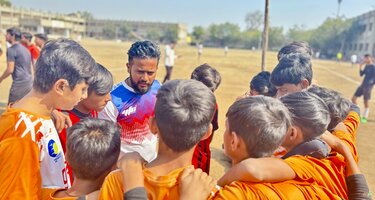Growing through sports: How football can influence everyday life
In the heart of Gujarat, two young project workers, Manjar and Manali, are supporting their communities through their work on From Field to Fanshop. They both believe in the potential of sport for personal development and a more inclusive, just future. Their personal stories and their work show how football can sustainably influence lives.
Back to football
Manjar Alam is from Rurka Kalan in Punjab. He has been playing football since he was five years old, representing his team at district, state, and national level throughout his youth. This is where he got to know the Youth Football Club Rurka Kalan (YFC), which he now works for. When he had to drop out of school after year 12 due to financial difficulties of the family, he found a job at YFC. At first, he focused on community work, but today he has found his passion again and works as a football coach for the initiative. He leads the weekly training sessions and pays close attention to their quality.
As part of YFC, Manjar was able to make football his profession, while also ensuring that other young people from his region can discover the sport. “I was also able to travel to Germany with the initiative for the Young Leader Training. There, I worked with various schools and learned how to be a better coach”, he says.
Manali Sonjob from Bidada, Gujarat, a colleague of Manjar’s, also has a passion for sport. During her time at school, she always played a sport and often took part in team games such as kho-kho and kabaddi, which are very popular in India. However, after finishing school, she had to look for employment opportunities and lost touch with her interest in sport. But when she came across the YFC and the From Field to Fanshop initiative, she was able to reconnect with football. As a youth counsellor, she is supporting the sport for development part of the initiative. “I used to think that football was a dangerous game with no rules, but now I understand how it works and really enjoy it.”
Every day, Manali works with the participating children and their parents on soft skills such as teamwork, sharing knowledge about health and nutrition. This holistic approach, which includes other skills in addition to football and school education, is an important part of the concept at From Field to Fanshop.
More inclusivity
Manjar and Manali have not only benefited from the initiative themselves by finding a job and reconnecting with their passion, but they are learning more every day about empowering children and young people through football and sport in general. As a result, they are becoming experts in spreading the importance of teamwork, communication, leadership skills, and equality.
Manjar's work has opened his eyes to deep-rooted social problems. “Here in Gujarat, discrimination based on religion and caste is part of everyday life. In our work, we want to focus even more on these challenges,” he explains. On a day-to-day basis, he wants to set an example for the children and explain the impact of treating everyone equally and with respect.
Manali also works every day to reduce the prevailing problems in her society. She is responsible for 157 students in grades 5 to 8 and believes that positive changes are possible through sport, for example in terms of gender balance: “At the beginning of the training sessions, I noticed that there were fewer girls than boys. But over time, we have seen a change and now the ratio of boys to girls is almost equal.” Manjar has also noticed that the girls have shown more interest in competitions since they started taking part in the football training sessions. There are now 18 girls in his football team - before the initiative started, there were only four.

A new, self-confident generation
Manali hopes that playing football will teach the participating children and young adults new skills, while also leading to positive changes at their homes and in their communities. By acting as a role model, football – a traditionally male-dominated sport – can promote an inclusive, respectful environment, leading to a more gender equality in the Gujarati communities in the long term. “I want girls to see football as a career pathway”, she says.
Similarly, Manjar wants to continue working towards breaking down prejudices and barriers with the initiative. “Our training sessions are aimed at girls and boys. It is very important to me that everyone feels both physically and emotionally safe”, he explains. This is the only way to convey the important message of gender equality to children. By enjoying the game and having fun during training sessions, they will be motivated to contribute to a more inclusive society.
The project is still quite new and Manali emphasises that it will take time for the participating children and teenagers to develop their new skills and implement them in their everyday lives. “This makes it even more important to establish good relationships with them and to observe how the initiative affects their lives in the medium term”. According to her estimates, in another five to ten years, it will be possible to see the fruits of the work in the form of a new generation of self-confident, self-determined boys and girls in Gujarat.
